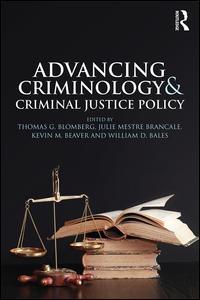Description
Advancing Criminology and Criminal Justice Policy
Coordinators: Blomberg Thomas, Brancale Julie, Beaver Kevin, Bales William
Language: English
Subjects for Advancing Criminology and Criminal Justice Policy:
Keywords
Crime and Public Policy; Criminology and Public Policy; Crime Control in America; Corrections; Rehabilitation; Special population policies; Incarceration; Community Justice; Community Policing; Risk Assessment; Substantial Assistance Departure; Sentencing Guidelines; BJS; OJJDP; Violated; Hot Spots Policing; Criminal Justice Policy; Antisocial Conduct; Justice Reinvestment; Situational Crime Prevention; Mandatory Minimum Sentences; Mandatory Minimum; Restorative Justice; Substance Abuse Treatment; Sex Offenders; Drug Courts; Mass Incarceration; Translational Criminology; Community Crime Prevention; Community Supervision; Young Men; Biosocial Research; Crack Cocaine; Intensive Supervision Probation; State Governments Justice Center
Publication date: 03-2016
· 15.6x23.4 cm · Paperback
Publication date: 03-2016
· 15.6x23.4 cm · Hardback
Description
/li>Contents
/li>Readership
/li>Biography
/li>
Advancing Criminology and Criminal Justice Policy is a definitive sourcebook that is comprised of contributions from some of the most recognized experts in criminology and criminal justice policy. The book is essential reading for students taking upper level courses and seminars on crime, public policy and crime prevention, as well as for policy makers within the criminal justice sphere.
There has been a growing recognition of the importance of evidence-based criminal justice policies from criminologists, policymakers, and practitioners. Yet, despite governmental and professional association efforts to promote the role of criminological research in criminal justice policy, political ideologies, fear, and the media heavily influence criminal justice policies and practices.
Bridging the gap between research and policy, this book provides the best-available research evidence, identifies strategies for informing policy and offers direct policy recommendations for a number of pressing contemporary issues in criminal justice, including:
- Delinquency, intervention programs and community crime prevention,
- Problem-oriented policing and the science of hot-spot policing,
- Sentencing and drug courts,
- Community corrections, incarceration and rehabilitation,
- Mental illness, gender, aging and indigenous communities.
Volume Introduction: Advancing Criminology and Criminal Justice Policy PART I: Introduction Introduction: Evidence, Evaluation, and Strategies for Moving Criminal Justice Policy Forward 1. Evidence-Informed Criminal Justice Policy: Looking Back, Moving Forward2. Policy Evaluation and Assessment 3. The Role of Theory, Ideology, and Ethics in Criminal Justice Policy 4. Translational Criminology: A New Path Forward PART II: Crime Prevention Introduction: Individual, Family, and Community Prevention Programs 5. Juvenile Delinquency Prevention Programs 6. Opportunities for Public Policies to Strengthen Families and Prevent Crime 7. Community Crime Prevention 8. Situational crime prevention PART III: Policing and Court Sentencing Introduction: Policing 9. Community Policing 10. Problem-Oriented Policing: Evidence v. Framing in Implementation Success 11. The Science and Practice of Hot-Spots Policing Anthony Braga Introduction: Court Sentencing 12. Mandatory Minimum Penalties: Evidence-Based Consequences and Recommendations for Policy and Legal Reform13. Sentencing Disparities 14. Sex Offender Legislation and Policy 15. Drug Courts and Drug Policy 16. Did the Gregg Decision Overcome the Arbitrary and Discriminatory Use of the Death Penalty So Prevalent in Furman? PART IV: Corrections and Rehabilitation Introduction: Community Corrections 17. Improving Correctional Supervision: What does the Research Tell Us? 18. Smart Sentencing Revisited: Assessing the Policy/ Practice Implications of Research on Electronic Monitoring and other Intermediate Sanctions Introduction: IncarcerationEditors 19. Confinement in Local Jails: Institutions and Their Clients Neglected by Criminologists 20. Does a Prison Term Prevent or Promote More Crime?Introduction: Reentry and Recidivism Reduction Programs 21. Reentry from Incarceration to Community: A Convergence of Practices based on Scientific Evidence to Enhance Citizenship 22. The Effects of Prison Programming 23. The Challenge of Integrating Restorative Justice into the "Deep-End" of Criminal Justice 24. Juvenile Justice Education Introduction: Special Populations 25. Inmates with Serious Mental Illnesses: Current Knowledge and Challenges for Practice 26. Women’s Incarceration and Motherhood: Policy Considerations 27. Aging and Dying in Prison: At the Intersection of Crime, Costs, and Healthcare 28. Native American Criminal Justice: Toward Evidence-Based Policy and Practice PART V: Conclusion Introduction: The Future of Criminology and Criminal Justice Policy 29. Mass Incarceration, the Carceral State, and Evidence-Based Research 30. The Media and Criminal Justice Policy and Practices 31. Cost-Effective and Accountable Criminal Justice Policy 32. The Utility of Findings from Biosocial Research for Public Policy 33. Bringing Evidence into Criminal Justice Policy
Thomas G. Blomberg is Dean and Sheldon L. Messinger Professor of Criminology, and Executive Director of the Center for Criminology and Public Policy Research at Florida State University, USA.
Julie Mestre Brancale is a doctoral candidate and graduate research assistant for the Center for Criminology and Public Policy Research at Florida State University, USA.
Kevin M. Beaver is Professor in the College of Criminology and Criminal Justice at Florida State University, USA.
William D. Bales is Professor in the College of Criminology and Criminal Justice at Florida State University, USA.
These books may interest you

Criminal JusticeAn Introduction 61.09 €



